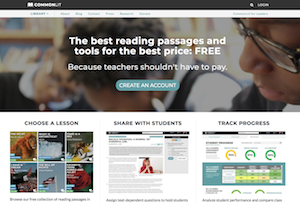At a Glance
What is it?
Website
Commonlit

Commonlit is a free digital library that provides built-in tools to better reading comprehension. These tools include on-page translations, guided reading questions, discussion questions, and on-page definitions and notes to clarify tough subjects. The collection includes fiction, such as a letter from the West about Manifest Destiny and non-fiction, such as Plessy vs. Ferguson that can also be organized by reading level, grade, or subject.
Getting Started
While you have access to the literature provided by Commonlit without making an account, it is a good idea to create one. By creating an account, you are able to save readings for later and organize your materials by class. Click “Login” then “Create Account” and follow the instructions. Once you create your account, Commonlit will guide you to a walkthrough of their website. This walkthrough shows teachers how to use the site, including how to use the translate and read-aloud features, how to use Commonlit to grade, and an overview of their score reporting feature. At the end of the intro, Commonlit will ask you how you plan on using their materials. You must select either digitally or printed out as worksheets. Either way, regardless of the option you choose, you are able to go back and forth between digital and print, so don’t worry too much about which option you select. If you do decide to print out readings, Commonlit also provides you with the questions and polls that are found on the digital version too.
After you finish the walkthrough, you will be taken to your classroom management page. Begin by creating a class and selecting the appropriate parameters such as grade level, course, and course name. Once you create your class, you will gain access to a code used to invite students to your classroom.
Before inviting students, it is a good idea to prepare material for your classroom. On the upper left corner, click “Library” and view the drop down options. By clicking “View All Text,” you are able to view all of Commonlit’s literature organized by grade level, themes, or genres. Try searching relevant terms for your lesson such as “social studies,” “American history,” or “colonial America” and see what type of readings come up. Make sure you use all the filters Commonlit has to offer to find what is best for your lessons. Examples of a few filters Commonlit provides include grade level, themes and genres, length of the reading, and literary devices.
Once you find a text you think is appropriate for your lesson, click on it and you will be able to read over the material. If you think it is a good fit, click “Assign Text” at the top of the page. You will then need to choose the class you wish to assign the text to plus a due date. Once you click “Finish,” the text will be assigned to your class.
Examples
Since the goal of Commonlit is to help educators, it provides teachers with plenty of resources. On their website, a new feature that Commonlit is trying out is providing full units and lesson plans to teachers. More and more teachers are beginning to contribute their lesson plans to Commonlit to be used by other teachers. This is a good page to check into often to see if more lesson plans have been added. Commonlit also runs a blog on their site answering frequently asked questions, interacting with the community, and providing information about their resources.
Sarah Cooper teaches 8th grade US History in California and she has found Commonlit to be quite effective in her classroom. In her blog post, she details how to use Commonlit to increase engagement in the classroom. Her three guidelines to boost classroom engagement are to make contributions in class, make connections to the resources, and to go beyond the resources provided. This is a good way to bring in other tech tools as a way of engaging students a step further. For example, you could have students read a passage on the American Revolution, then have them watch a video and answer questions about it also. Commonlit is a great resource to pair with other digital tools that you may be using in your classroom.
Samples of readings on Commonlit:
Fiction:
- The Poetry Quilt: A story of a young Puritan poet girl
- A Simple Gift: A story about a young boy meeting President Lincoln on a train
- The First Flag: The story of Betsy Ross creating the first flag told by a fellow seamstress
Non-fiction:
- The Articles of Confederation, 1777
- Letter from Birmingham Jail, Dr. Martin Luther King Jr., 1963
- President Reagan’s Speech at the Bradenburg Gate, President Ronald Reagan, 1987
